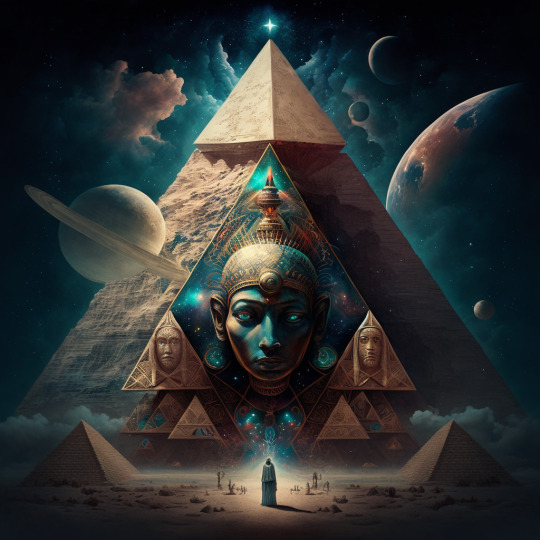#egyptian mysticism
Text
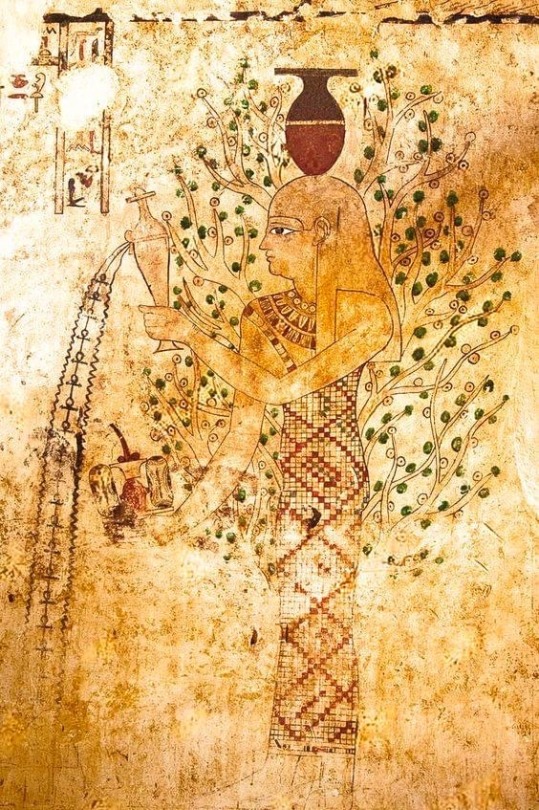

The sycamore tree in ancient Egyptian tradition
12 notes
·
View notes
Text
GODDESS FEMININE MAGIC ; WHAT CAN WE LEARN FROM THEM? PICK A GODDESS
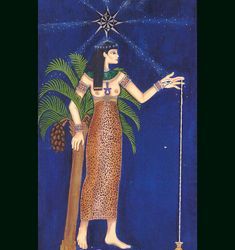
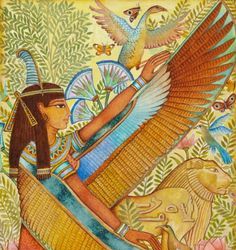
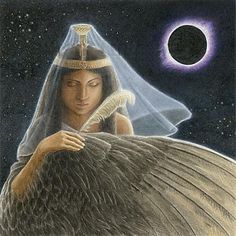
PILE 1 - SESHAT - SCRIPTING. JOURALISM. CONNECTING TO THE STARS. DIVINITY CODES UNLOCKING.
If you feel connected to this goddess archetype, be confident in your abilities to succeed. Manifesting abilities are strongest in writing. Look to the stars for answers as this connects you to the best possible outcome. A lot of you are connected to numerology, astrology and astro sciences and there are a abilities around tech advances for some of you. Be more open to infinite possibilities as this is a remarkable time to get to know yourself and following your dreams. Ase !
PILE 2 - MAAT - UNLOCKING THE TRUTH. WHAT IS IT THAT YOU REMEMBER?
So, this group might be LGBT, non-binary or you could also be straight. This goes for everyone however I seen something about the non-binary group as well.
You guys have a lot of answers that you keep hidden from the outside world. What are you doing? Your light shines when you are embarking in your spirit's mission. You are the sun and the shadows bring favor when you open up to them. What is it that you see? You can't run from them forever, make peace with your shadows. They are the only thing that shows your super power.
Bless.
PILE 3 - NEPHTHYS - ORACLE. SEER. CREATOR. MYSTIC.
Play around a little. Your spark is noticed by thousands of people, you here me? Your inner child is a magnet for beautiful ideas to come through you and escape. Their like mini bubbles castrating around your brain, and finding new ways to deliver magic to anyone it touches. Do yourself a favor and get to writing that book, finishing those puzzles, or even creating that sculpture. You're a magnet for success, everything you touch is Gold. ;) Ase!
#egyptian goddesses#pick a pile#pick a character#mystic#creator#love#channeler#mystic reader#pick a card
113 notes
·
View notes
Text
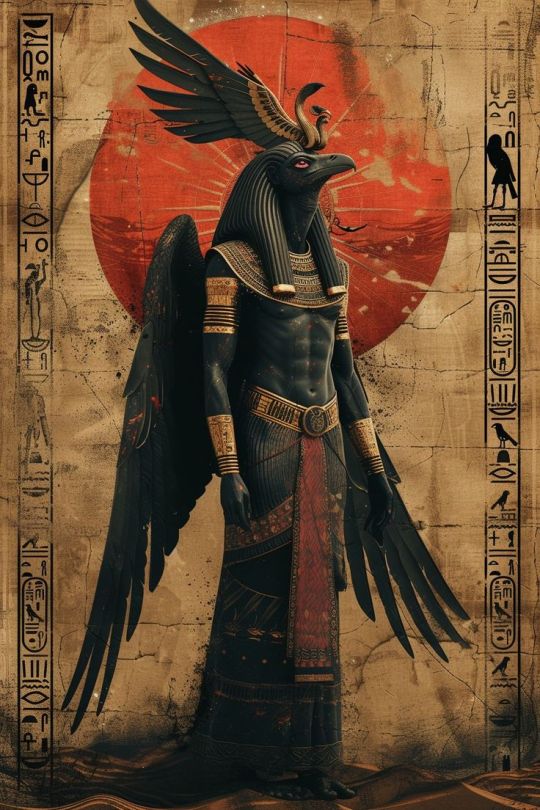
58 notes
·
View notes
Text
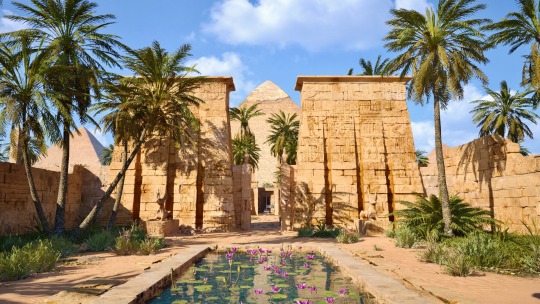



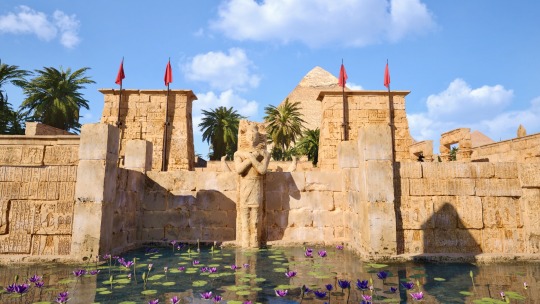

☀️⚜️The Beauty of ttp 2 part one⚜️☀️
#pics(edits) made by me :)#assassin1513#video games#gaming#games#the talos principle#the talos principle 2#talos#talos principle 2#ttp 2#egypt#ancient egypt#egyptian#egypt aesthetic#screenshots#screenshot#game screenshots#virtual photography#pyramid#mystic#blue sky#egyptology#egypt history#history
54 notes
·
View notes
Text
Mystic Egyptian Polytheism Resource List
Because I wanted to do a little more digging into the philosophy elements explored in Mahmoud's book, I took the time tonight to pull together the recommended reading he listed toward the end of each chapter. The notes included are his own.
MEP discusses Pharaonic Egypt and Hellenistic Egypt, and thus some of these sources are relevant to Hellenic polytheists (hence me intruding in those tags)!
Note: extremely long text post under this read more.
What Are The Gods And The Myths?
ψ Jeremy Naydler’s Temple of the Cosmos: The Ancient Egyptian Experience of the Sacred is my top text recommendation for further exploration of this topic. It dives deep into how the ancients envisioned the gods and proposes how the various Egyptian cosmologies can be reconciled.
ψ Jan Assmann’s Egyptian Solar Religion in the New Kingdom: Re, Amun and the Crisis of Polytheism focuses on New Kingdom theology by analyzing and comparing religious literature. Assmann fleshes out a kind of “monistic polytheism,” as well as a robust culture of personal piety that is reflected most prominently in the religious literature of this period. He shows how New Kingdom religious thought was an antecedent to concepts in Hermeticism and Neoplatonism.
ψ Moustafa Gadalla’s Egyptian Divinities: The All Who Are The One provides a modern Egyptian analysis of the gods, including reviews of the most significant deities. Although Gadalla is not an academic, his insights and contributions as a native Egyptian Muslim with sympathies towards the ancient religion are valuable.
How to Think like an Egyptian
ψ Jan Assmann’s The Mind of Egypt: History and Meaning in the Time of the Pharaohs is my top text recommendation for further exploration of this topic. It illuminates Egyptian theology by exploring their ideals, values, mentalities, belief systems, and aspirations from the Old Kingdom period to the Ptolemaic period.
ψ Garth Fowden’s The Egyptian Hermes: A Historical Approach to the Late Pagan Mind identifies the Egyptian character of religion and wisdom in late antiquity and provides a cultural and historical context to the Hermetica, a collection of Greco-Egyptian religious texts.
ψ Christian Bull’s The Tradition of Hermes Trismegistus: The Egyptian Priestly Figure as a Teacher of Hellenized Wisdom provides a rich assessment of the Egyptian religious landscape at the end of widespread polytheism in Egypt and how it came to interact with and be codified in Greek schools of thought and their writings.
How To Think Like A Neoplatonist
Radek Chlup’s Proclus: An Introduction is my top text recommendation for further exploration of this topic. It addresses the Neoplatonic system of Proclus but gives an excellent overview of Neoplatonism generally. It contains many valuable graphics and charts that help illustrate the main ideas within Neoplatonism.
ψ John Opsopaus’ The Secret Texts of Hellenic Polytheism: A Practical Guide to the Restored Pagan Religion of George Gemistos Plethon succinctly addresses several concepts in Neoplatonism from the point of view of Gemistos Plethon, a crypto-polytheist who lived during the final years of the Byzantine Empire. It provides insight into the practical application of Neoplatonism to ritual and religion.
ψ Algis Uzdavinys’ Philosophy as a Rite of Rebirth: From Ancient Egypt to Neoplatonism draws connections between theological concepts and practices in Ancient Egypt to those represented in the writings and practices of the Neoplatonists.
What Is “Theurgy,” And How Do You Make A Prayer “Theurgical?”
ψ Jeffrey Kupperman’s Living Theurgy: A Course in Iamblichus’ Philosophy, Theology and Theurgy is my top text recommendation for further exploration of this topic. It is a practical guide on theurgy, complete with straightforward explanations of theurgical concepts and contemplative exercises for practice.
ψ Gregory Shaw’s Theurgy and the Soul: The Neoplatonism of Iamblichus demonstrates how Iamblichus used religious ritual as the primary tool of the soul’s ascent towards God. He lays out how Iamblichus proposed using rites to achieve henosis.
ψ Algis Uzdavinys’ Philosophy and Theurgy in Late Antiquity explores the various ways theurgy operated in the prime of its widespread usage. He focuses mainly on temple rites and how theurgy helped translate them into personal piety rituals.
What Is “Demiurgy,” And How Do I Do Devotional, “Demiurgical” Acts?
ψ Shannon Grimes’ Becoming Gold: Zosimos of Panopolis and the Alchemical Arts in Roman Egypt is my top text recommendation for further exploration of this topic. It constitutes an in-depth look at Zosimos—an Egyptian Hermetic priest, scribe, metallurgist, and alchemist. It explores alchemy (ancient chemistry and metallurgy) as material rites of the soul’s ascent. She shows how Zosimos believed that partaking in these practical arts produced divine realities and spiritual advancements.
ψ Alison M. Robert’s Hathor’s Alchemy: The Ancient Egyptian Roots of the Hermetic Art delves deep temple inscriptions and corresponding religious literature from the Pharaonic period and demonstrates them as premises for alchemy. These texts “alchemize” the “body” of the temple, offering a model for the “alchemizing” of the self.
ψ A.J. Arberry’s translation of Farid al-Din Attar’s Muslim Saints and
Mystics: Episodes from the Tadhkirat al-Auliya contains a chapter on the Egyptian Sufi saint Dhul-Nun al-Misri (sometimes rendered as Dho‘l-Nun al-Mesri). He is regarded as an alchemist, thaumaturge, and master of Egyptian hieroglyphics. It contains apocryphal stories of his ascetic and mystic life as a way of “living demiurgically.” It is an insightful glimpse into how the Ancient Egyptian arts continued into new religious paradigms long after polytheism was no longer widespread in Egypt.
Further Reading
Contemporary Works
Assmann, Jan. 1995. Egyptian Solar Religion in the New Kingdom: Re, Amun and the Crisis of Polytheism. Translated by Anthony Alcock. Kegan Paul International.
Assmann, Jan. 2003. The Mind of Egypt: History and Meaning in the Time of the Pharaohs. Harvard University Press.
Bull, Christian H. 2019. The Tradition of Hermes Trismegistus: The Egyptian Priestly Figure as a Teacher of Hellenized Wisdom. Brill.
Chlup, Radek. 2012. Proclus: An Introduction. Cambridge University Press.
Escolano-Poveda, Marina. 2008. The Egyptian Priests of the Graeco-Roman Period. Brill.
Fowden, Garth. 1986. The Egyptian Hermes: A Historical Approach to the Late Pagan Mind. Cambridge University Press.
Freke, Tim, and Peter Gandy. 2008. The Hermetica: The Lost Wisdom of the Pharaohs. Jeremy P. Tarcher/Penguin.
Gadalla, Moustafa. 2001. Egyptian Divinities: The All Who Are The One. Tehuti Research Foundation.
Grimes, Shannon. 2019. Becoming Gold: Zosimos of Panopolis and the Alchemical Arts in Roman Egypt. Princeton University Press.
Jackson, Howard. 2017. “A New Proposal for the Origin of the Hermetic God Poimandres.” Aries: Journal for the Study of Western Esotericism 17 (2): 193-212.
Kupperman, Jeffrey. 2014. Living Theurgy: A Course in Iamblichus’ Philosophy, Theology and Theurgy. Avalonia.
Mierzwicki, Tony. 2011. Graeco-Egyptian Magick: Everyday Empowerment. Llewellyn Publications.
Naydler, Jeremy. 1996. Temple of the Cosmos: The Ancient Egyptian Experience of the Sacred. Inner Traditions.
Opsopaus, J. 2006. The Secret Texts of Hellenic Polytheism: A Practical Guide to the Restored Pagan Religion of George Gemistos Plethon. New York: Llewellyn Publications.
Roberts, Alison M. 2019. Hathor’s Alchemy: The Ancient Egyptian Roots of the Hermetic Art. Northgate Publishers.
Shaw, Gregory. 1995. Theurgy and the Soul: The Neoplatonism of Iamblichus. 2nd ed. Angelico Press.
Snape, Steven. 2014. The Complete Cities of Ancient Egypt. Thames & Hudson.
Uzdavinys, Algis. 1995. Philosophy and Theurgy in Late Antiquity. Wheaton, IL: Quest Books.
Uzdavinys, Algis. 2008. Philosophy as a Rite of Rebirth: From Ancient Egypt to Neoplatonism. Lindisfarne Books.
Wilkinson, Richard H. 2000. The Complete Temples of Ancient Egypt. Thames & Hudson.
Ancient Sources in Translation
Attar, Farid al-Din. 1966. Muslim Saints and Mystics: Episodes from the Tadhkirat alAuliya. Translated by A.J. Arberry. London: Routledge & Kegan Paul.
Betz, Hans Dieter. 1992. The Greek Magical Papyri in Translation, Including the Demotic Spells. Chicago: University of Chicago Press.
Copenhaver, Brian P. 1995. Hermetica: The Greek Corpus Hermeticum and the Latin Asclepius in a New English Translation, with Notes and Introduction. Cambridge: Cambridge University Press.
Guthrie, Kenneth. 1988. The Pythagorean Sourcebook and Library: An Anthology of Ancient Writings which Relate to Pythagoras and Pythagorean Philosophy. Grand Rapids, MI: Phanes Press.
Iamblichus. 1988. The Theology of Arithmetic. Translated by Robin Waterfield. Grand Rapids, MI: Phanes Press.
Iamblichus. 2003. Iamblichus: On the Mysteries. Translated by Clarke, E., Dillon, J. M., & Hershbell, J. P. Atlanta: Society of Biblical Literature.
Iamblichus. 2008. The Life of Pythagoras (Abridged). Translated by Thomas Taylor. Whitefish, MT: Kessinger Publishing.
Lichtheim, Miriam. 1973-1980. Ancient Egyptian Literature. Volumes I-III. Berkeley: University of California Press.
Litwa, M. David. 2018. Hermetica II. Cambridge: Cambridge University Press.
Majercik, Ruth. 1989. The Chaldean Oracles: Text, Translation, and Commentary. Leiden: Brill.
Plato. 1997. Plato: Complete Works. Edited by John M. Cooper and D. S. Hutchinson. Indianapolis: Hackett Publishing.
Plotinus. 1984-1988. The Enneads. Volumes 1-7. Translated by A.H. Armstrong. Cambridge, Massachusetts: Harvard University Press.
Van der Horst, Pieter Willem. 1984. The Fragments of Chaeremon, Egyptian Priest and Stoic Philosopher. Leiden: E.J. Brill.
#mystic egyptian polytheism#resource list#philosophy#neoplatonism#egyptian polytheism#hellenic polytheism#hermeticism
38 notes
·
View notes
Text

16
Yara touched a nerve insinuating that Astaroth would look for a loophole to get out of their marriage, will that finally get her talking or will it get worse?
“Asti, please, don’t....I...I don’t know how to handle this…I’m scared..” Finally she admitted it, a bit muffled since his finger hadn't moved. One tear making a slow trek down her cheek. She’d been afraid of losing him before, but now it was utter terror. She was messing up and now she’d gone and made him mad.
From shushing her, as he saw that his words had finally broken through the wall she’d put up and getting her to say what was wrong, to cupping her cheek and wiping her tear with his thumb, Astaroth’s expression and voice instantly softened. “Of?” He thanked whatever deity had helped him this time silently, and also the Fates.
“These women are confident and seductive, goddesses and succubi. I'm a mess, in all ways. The woman you were talking to today annoyed you, but what about next time? What if your mind changes about wanting this to work? What if you no longer want me?” her voice dropped in volume and was strained for her next words, “just like everyone else has in my life?” Her voice trembled and cracked, her whole body began to tremble, and more tears escaped the confines of her eyes where she'd been trying to hold them in making small rivers as they traversed her cheeks.
Now it was Astaroth’s turn to sit mute and consider his response, consider it very carefully. He wished for something stronger than the demon's brew he had, which he finished in one swallow now, to give him a moment to think of something to say. Some day he was going to kill Lucifer, but he was going to do it excruciatingly slowly and painfully. There was no reason his wife should suffer like this, doubt what he’d said, what he’d vowed.
“Darling, this is not the place for this conversation.” In an instant they were back in the cabin on the beach, on the couch. Yara’s flowers from earlier were in a vase on the table. “Now, this is better.” He sighed and tightened his hold on her hand slightly. “Yara, I don't know how many ways I can say the same thing till you understand. I thought we had agreed, that you understood.” He now knew what the problem was but he had no idea how to fix it. “Together. We’re going to do this, TOGETHER. Always. No other way. No one else. You and me. What happened in the past with anyone else is irrelevant. I can’t undo who I have been with. From now on, there is only you. We are TOGETHER. I vow it to the Primus Sator.” He knew what he’d just done, and hoped she would not make him regret it.
Now her tears flowed and she tried to pull away, to flee like she always did. She wanted to hide till the hurt in her chest was gone. The problem was, he wouldn't let her. His grip on her hand was tight, and he was holding her face with his other hand. She was trapped. Trapped with someone who just like her father, her brothers, her mother, any friends, and every lover, would throw her away when he no longer had a use for her. Trapped with someone that she didn't want to lose. Trapped with someone who was starting to mean something to her. Trapped with someone who...had just made a vow that hadn’t sunk in yet.
“Everyone leaves!” Her voice shook almost as much as her body, and her eyes dropped to the middle of his chest. “Before tonight I was able to delude myself that..” She took a stuttered breath and tried to continue, “that we could do this and you would want it to work. That somehow we could figure it out and you’d be happy with whatever we came up with. Seeing women I could never compete with in any way, ready to take my place…it made me feel all unsure and unsteady again. I always end up alone, Astaroth.” Her eyes slowly rose to look at his. “I realized how easy it would be to lose you. How you had options that were far superior to me. I can't compete or compare. You know I'm an emotional mess. Why would you choose that?” Her voice broke, she licked her lips, then bit down on the bottom one.
“Did you hear what I just said?” His voice was quiet. He now understood she was battling demons he couldn’t fight for her. He’d given her a weapon, but she hadn’t picked it up. Astaroth wasn’t sure that she’d even noticed it. He had to get her to pay attention to what he’d said, not what she’d expected him to.
“You said that we were going to do this together. I know. I know that’s what you said, but your mind could change. Women who are gorgeous and easier to deal with could offer you a different life. You could find someone that you have a connection with that is stronger.” Yara was fighting hysteria. At the moment she was winning, but she wasn’t sure how much longer that she could hold out.
“What exactly did I say? Repeat it?” Astaroth tried to will her to remember. To have heard the words. The vow he made was unbreakable. He’d made it full well knowing that. He also knew there was a fuck ton more going on than either of them knew, and he trusted the Fates a lot more than he trusted Lucifer’s machinations. If they allowed the wedding, then there was a reason.
“You said we’re going to do it together. You and me. No one else. Just us. We can’t change the past, so we’re going to ignore it. Just you and me, together.” Yara was reciting it, her head alternating back and forth with her sing-song voice, changing the words a little as she went. Astaroth nodded along as she did, waiting for her to get to the part that he hoped she would realize how much this all meant to him. When she paused after the last part he wasn’t sure if she hadn’t heard, hadn’t realized, or was thinking on it. Then her eyes went wide as she looked at his, and he knew. “You...you..Asti..you swear… to the Primus Sator…the Creator?” Her brows started coming together, a mixture of shock and incredulity coming to her face. “Really? For me? For us? You’re sure?” Her eyes searched his face. Was she understanding him correctly? Had he thought about this? “You can’t take that back...Asti! You can’t!” Her eyes searched his. What was he doing?
“Yes, really. For US. I know exactly what I have done, my Papilio, and I damn well meant it. I do not know what it is that truly brought us together in this, but I intend to find out. You can work with me or against me, but you are now stuck with me. Sorry!” Astaroth smirked amused, looking into her beautiful green eyes, and realizing that he was falling in love for the very first time.

banner by @cafekitsune
#writeblr cafe#writeblrcafe#writeblr#authorblr#writerblr#fiction#fantasy#dark fantasy#paranormal#supernatural#demons#original world#fantasy romance#paranormal romance#forced marriage#gods#deities#greek pantheon#egyptian pantheon#roman pantheon#norse pantheon#mythology#folklore#mystical beings#mythological creature#found family#revealed identity#my ocs#my writing#original story
10 notes
·
View notes
Text

Happy ArtMonday!
Today I can finally show this artwork ^^
It is a revisited piece, reborn from an original drawing I made 15 years ago
In the heart of Edinburgh lies a haven of secrets, guarded by three sisters, in a world teeming with darkness and mysteries.
In this meticulously artwork, the youngest sister, Rina, stands amidst a labyrinth of knowledge, her sanctuary against the creatures of the night. But she is more than a mere guardian of books—she is a keeper of secrets, a seeker of truth, and a sentinel against the shadows.
Painted with over 170 hours of painstaking detail and imbued with rich symbolism, 'The Lorewarden' is a true labor of love and dedication. Two full days were devoted solely to labeling the 250 intricately detailed books of this extraordinary library. From real tomes to fictional volumes, each book adds depth and intrigue to Rina's quest for knowledge.
Crafted with unwavering determination, this illustration captures the essence of a universe where darkness lurks just beyond the veil of ignorance.
Enter the realm of "The Lorewarden" and join Rina on her quest to uncover the truths hidden within those countless pages. Here, magic, myth, and mystery collide and every word holds a secret waiting to be unveiled.
Are you ready to lose yourself in the exploration of these shelves, discovering which books are fictional and which are not?
Story/Universe is © @valkblue, Character is © both of us.
Software used: Clip Studio Paint.
#isilrinart#my ocs#fanart#redraw#books#knowledge is power#antiquity#greek mythology#norse mythology#egyptian mythology#mysticism#norse gods#egyptian gods#red-figure pottery#Ancient Greek painted pottery style#vegvisir#magic#redhead beauty#LKL#RinaLKL
4 notes
·
View notes
Text
Lamb of God: Horus, Christ, and the Labarum
The development of the Sun-god archetype in Early Christianity was shaped by the preceding language and symbolism of Egyptian and Greco-Roman religions. When Constantine first beheld the vision of the labarum, the prevailing patterns of syncretism had already provided a shape and direction for the form that the early Christian Sun-god would take. It was represented by the Greek symbol of Chi-Rho.…
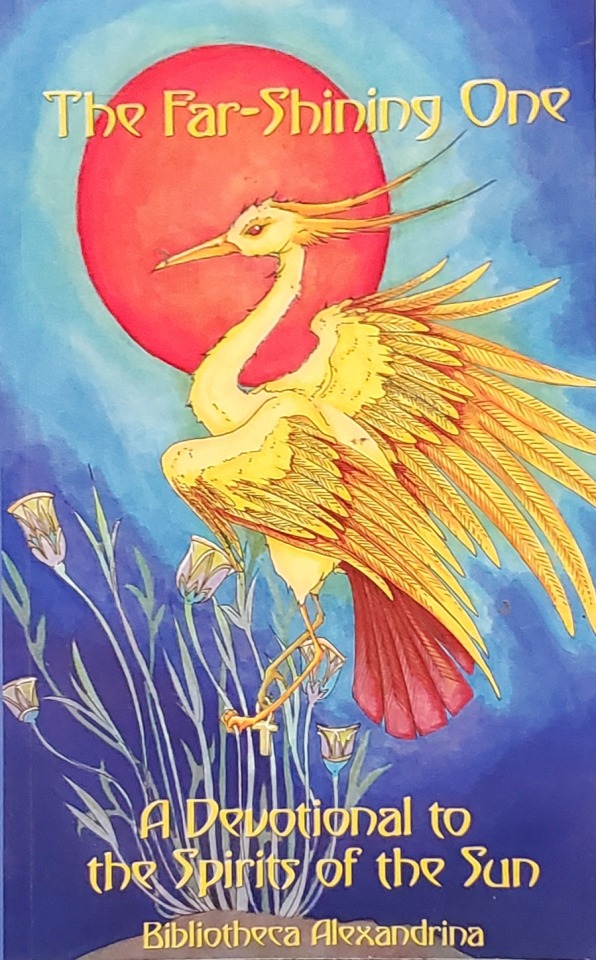
View On WordPress
#Ancient Egyptian relgiion#Apollo#Asklepios#astrotheology#Bacchus#Chi-Rho#Comparative Religions#Constantine#Dionysus#DM Murdock#EA Wallis Budge#Early Christianity#egyptian mythology#Gerald Massey#greco-roman religions#Horus#Isis#Jesus Christ#late antiquity religions#Magick#mysticism#Mythology#Nigel Pennick#Ophiuchus#perfected saints#Sir Flinders Petrie#Sol Invictus#Spirituality#Symbolism#the cult of the sun god
2 notes
·
View notes
Text
Philippine Eagle Prophecy And Symbolism
The Following Channel is from higher powers, Divine, the ancestral plane and is prophetic through Quornesha S. Lemon| Whether the Phillippine Eagle appears in dreams, visions, waking life or synchronicities, it is a sign and message that blessings, prosperity and a release from a generational curse is upon you. Your destiny is being unleashed. And your calling is being initiated. What held you back will no longer have access to you. The divine has been watching you from afar and every wrong, every loss that you’ve had to accept will receive recompense. It is symbolic of blessings, recovery, renouncing vows, annulment of toxic vows or beliefs, removal of demonic strongholds. It is also symbolic of a season of confidence in your calling. You are being called forth. You don’t have to tell people who you are anymore nor whose you are, they will now know, witness and sense it. You will see things from a ‘sense of humor’ perspective. You no longer have to ‘threaten’ others for bothering you, all you have to do is pray, and let it be.
You are moving into a season, where Moses, an ancient ancestor has been awakened. And if anyone or anything is sitting on your blessings, holding your money, attacking you in the realm of spirit, sitting on your ideas must be destroyed. Destruction will know their name. Jealousies and envies must bow to the will of the most high. A table has been made in their presence and the haters or gatekeepers against your blessings have now become the audience. And anything or anyone that has rejected you will now watch you rise. For those who hide you divine will hide them in the worst way as well. Divine is your vindicator. Every curse, every road block, every hindrance will crumble away and a new day has dawned. Every delay in happiness and success will break.
The kingdom of divine, heavenly realms are opened to you. Your throne is ready. Be seated in your honor season. What denies you denies divine and he nor your ancestry will play about you.
People's hate, negativity, backstabbing, and betrayal are not your responsibility to carry. Divine is your vindicator and no one has gotten away. Divine has a special love for you and even though he hid his face from you for some time, his grace is upon you now.
We are entering into a season of Moses, so whosoever is holding your destiny, holding up your process, and the will that the divine has for you will suffer the consequences. They will be like pharaohs, and then the plagues will start.
It is written in the divine Akashic Records that this is to be so. It is universal. Divine commands that thing, that person, that situation to loose you immediately and let you go into the promised land he has for you.
Divine is in all creation.
This message isn't, obviously resonant with all whose paths it crosses, as perhaps you may encounter someone of this vernacular, mastery or skill. Therefore, it is a sign from the universe that you're meant to work with such a person.
Need further clarity or your own queries answered? Book your own reading as my schedule is full and I do not guarantee a reply on social media regarding this post.
If this is not you, then it is time to get clear to rejoin your tribe or the rest of the world of infinite beings. It's time to bring your light to the forefront. However, if you aren't able to invoke, heal or otherwise on your own, call on the assistance of shamans, healers, intuitive people, etc. to assist you. This synchronicity can possibly have specific meanings for you, it's time to get insight.
The Gift that Quornesha Has can never be duplicated, She is a Shaman, Writer, Healer, And Teacher with incredible prophetic/healing gifts. Please do not infringe upon her rights as the author. You are not permitted to reuse, nor are you to sale as you wish. This information has been made available to you for the purpose of introduction and demonstration. All rights reserved. If you'd like to use this in a magazine, online publication, or other, please ask for permission first. Legal actions will be taken if you proceed to impose. Be blessed, bless others and be at peace on your journey. What you do is coming back on you. Make sure that it is good, and all is well within you, through you and around you. The source sees all and knows what you think it does not.
#phillipine eagle#recompense#moses#blessings#healing#egyptian healing#psychic medium#mystic#mystic shaman#shamanism \#eagle#eagles#shaman#mystic shaman Goddess#quornesha#priestess#prophetess
3 notes
·
View notes
Text
"Unveiling the Mysteries: E. A. Wallis Budge's 'Egyptian Magic'—A Scholarly Odyssey into Ancient Mysticism"

"Egyptian Magic" by E. A. Wallis Budge serves as a captivating portal to the mystical world of ancient Egypt, where the realms of magic, religion, and spirituality seamlessly intertwined. Published in [year], this seminal work by Budge, a renowned Egyptologist, offers readers a comprehensive exploration of the magical practices and beliefs that permeated the daily lives of the ancient Egyptians. The title itself hints at the enigmatic allure that beckons readers into a realm where the boundaries between the mundane and the supernatural blur.
Budge, known for his extensive scholarship on Egyptology, brings to life the magical traditions of ancient Egypt with meticulous detail. The title "Egyptian Magic" acts as a prelude to a journey through the spells, rituals, and incantations that were integral to the spiritual landscape of this ancient civilization. Budge's prose, though rooted in academic rigor, retains a sense of wonder that makes the subject accessible to both scholars and enthusiasts alike.
One of the strengths of "Egyptian Magic" lies in Budge's ability to contextualize magical practices within the broader religious and cultural framework of ancient Egypt. Each chapter unfolds like a chapter in the Book of the Dead, revealing the layers of meaning behind the magical spells and their significance in the Egyptian worldview. The title becomes a guide through this esoteric terrain, inviting readers to decipher the symbols and incantations that held profound meaning for the practitioners of ancient Egyptian magic.
Budge delves into the different categories of magical practices, from healing spells to protective amulets, showcasing the diverse ways in which magic permeated every facet of Egyptian life. The title "Egyptian Magic" encapsulates this multifaceted exploration, promising readers a glimpse into the rituals that sought to harness cosmic forces and commune with the divine. Budge's meticulous research and translations transport readers back in time, allowing them to witness the rituals and ceremonies that were once an integral part of the Egyptian magical tradition.
The inclusion of hieroglyphic illustrations and translations of magical texts further enhances the immersive experience of "Egyptian Magic." Budge's expertise in deciphering ancient Egyptian scripts provides readers with a firsthand encounter with the original magical incantations. The title serves as a doorway to an ancient scriptorium, where the secrets of Egyptian magic are inscribed in symbols that continue to captivate and mystify.
Beyond the academic discourse, Budge's work touches upon the spiritual dimensions of ancient Egyptian magic. The title becomes a metaphorical key, unlocking the mystical teachings that guided the Egyptian magicians in their quest for spiritual enlightenment. Budge sheds light on the deep connection between magic and the afterlife, where spells and charms were believed to secure a favorable passage through the realm of the dead.
In conclusion, "Egyptian Magic" by E. A. Wallis Budge stands as a magnum opus that unravels the complexities of an ancient civilization's magical traditions. The title invites readers into a world where the mystical and the mundane coalesce, where words held the power to shape destinies and unlock the gates to the divine. Budge's meticulous scholarship, coupled with the evocative title, ensures that "Egyptian Magic" remains a timeless exploration of the enchantments that once echoed through the sacred temples and burial chambers of ancient Egypt.
"Egyptian Magic" by E. A. Wallis Budge is available in Amazon in paperback 11.99$ and hardcover 19.99$ editions.
Number of pages: 196
Language: English
Rating: 10/10
Link of the book!
Review By: King's Cat
#E. A. Wallis Budge#Egyptian Magic#Ancient Egypt#Mysticism#Magical practices#Religion#Spirituality#Enigmatic allure#Ancient civilization#Spells and rituals#Book of the Dead#Esoteric terrain#Symbols and incantations#Cosmic forces#Communing with the divine#Healing spells#Protective amulets#Egyptian worldview#Hieroglyphic illustrations#Translations of magical texts#Deciphering scripts#Original magical incantations#Scriptorium#Spiritual dimensions#Quest for enlightenment#Afterlife#Passage through the realm of the dead#Academic rigor#Hieroglyphic symbols#Ancient scripts
3 notes
·
View notes
Text
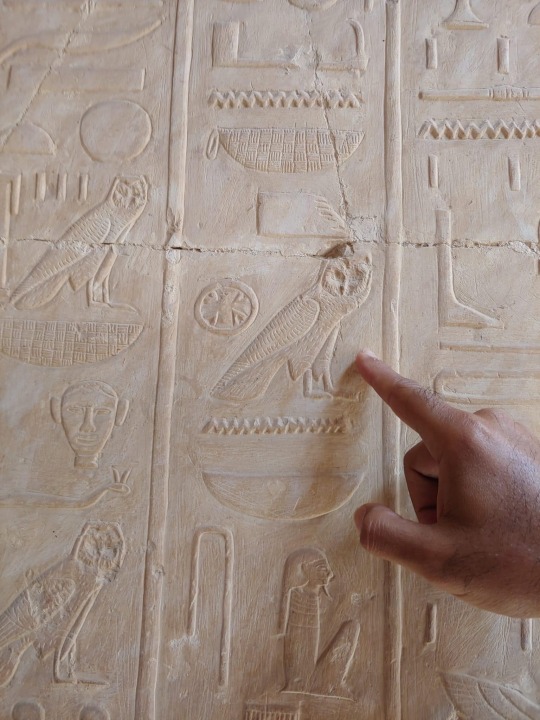
“The hieroglyphs for "Khemit", the ancient name for Egypt, and from which "alchemy" and "chemistry" get their name.” - Timothy Hogan
#Alchemy#Timothy Hogan#Egyptian mysticism#cross#crucible#fav#Abydos#temple#knights templar#ebionites#print this off later#templar collegia
154 notes
·
View notes
Text
Kemetism: Ancient Egyptian Spirituality and Its Modern Resurgence
Introduction
The sands of time have witnessed countless spiritual traditions, each weaving its own tapestry of beliefs, rituals, and practices. One of these is Kemetism, an ancient Egyptian spiritual path with rich gods, ceremonies, and philosophies. A living tradition in modern times, Kemetism is rooted in the fertile lands along the Nile.
Kemetism derives its name from “Kemet,” the ancient…
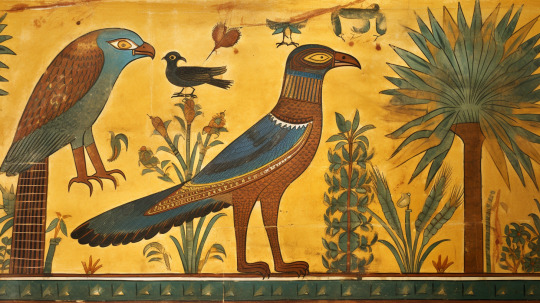
View On WordPress
#Afterlife#Altars#Ancestral Roots#Ancient Egypt#Anubis#Cosmic Balance#divine connection#Egyptian Gods#enlightenment#Hieroglyphs#Isis#Kemetic Practices#Kemetism#Ma&039;at#Meditation#Modern Kemetism#Mysticism#Nile River#Osiris#Pantheon#Ra#Sacred Rituals#Sacred Texts#Spiritual Growth#spiritual journey#Spiritual Revival#Spirituality#Talismans#The Spiritual Parrot
5 notes
·
View notes
Text
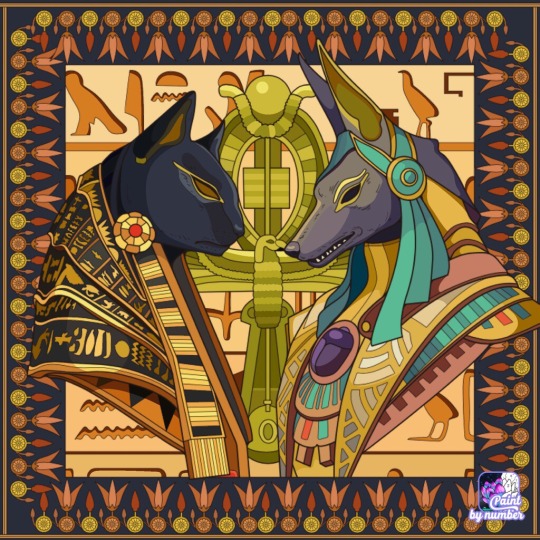
🐱👸☥🤴🐺✨
#Egyptian#Cat#Bastet#Bast#Jackal#Anubis#Goddess#God#Divine#Deity#Magical Creatures#Mystical Creatures#Supernatural Creatures#Ankh#Magic#Magical#Mystical#Supernatural#Heiroglyphics#Sigils#Ancient Egyptian#Art#App#Adult Colouring Book#Adukt Coloring Book#Paint By Number#My Post#My Upload
59 notes
·
View notes
Text
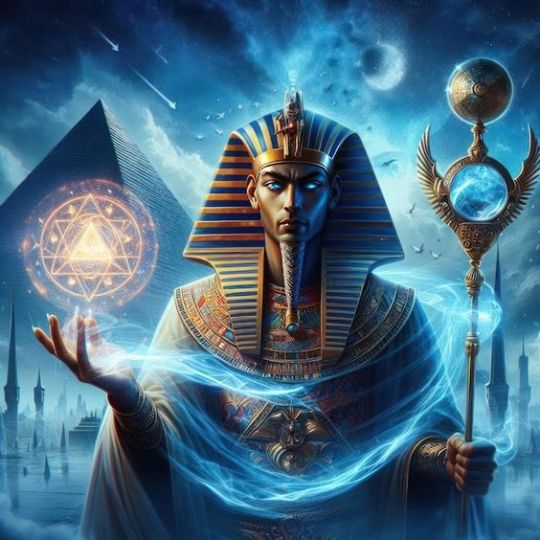
27 notes
·
View notes
Text
I've recently made the acquaintance of Adam Mahmoud, author of Mystic Egyptian Polytheism. I cannot begin to tell you how refreshing a perspective on Kemeticism he is.
Our practices are very different. He is very rooted in Neoplatonism and philosophical studies whereas I am more rooted in personal gnosis. Nevertheless I really value his work and perspectives as an Egyptian-American. Exploring modern mysticism and theology in Egypt via some of the resources he has shared has been very informative. I've been meaning to write a full review of his book (which is free) and simply have not gotten to it. I recommend checking it out, regardless of where you are in your practice!
#kemetic fandom#kemetic paganism#kemetic polytheism#egyptian paganism#egyptian polytheism#kemeticism#paganblr#egyptian mystic polytheism
45 notes
·
View notes
